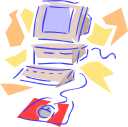

Technology Tip of the Month
by Deborah Healey
 Even if you're not an email junkie, you may find it useful
to check your email while you're away from home and work. Here are a few
suggestions to make this process easier.
Even if you're not an email junkie, you may find it useful
to check your email while you're away from home and work. Here are a few
suggestions to make this process easier.
(Notice that NOMAIL is one word, and that there is a space between SET, the list name, and NOMAIL. Capitalization is optional.)
When you return, you'll send a message to the same listserv computer and say
(MAIL gives you each message separately; DIGEST groups the messages every day into one message and sends you the single combined message; and INDEX creates an index list that you can use to request specific messages.)
If you're on a listproc system like NETEACH, you'll again send mail to the computer, not to the people on the list -- such as listproc@ukans.edu. In the message, say
(Capitalization is optional.)
When you return, you'll send a message to the same listserv computer and say
With many email programs, you can set an automated "out of office" reply that will tell people you're gone and won't be answering your mail in the usual immediate mode. Make sure your email program knows about mailing lists, however, or you'll find yourself dropped from any list you have forgotten to set to NOMAIL or to POSTPONE. Check the documentation or ask your email administrator to be sure.
If you use web-based email like Hotmail, you're ready to roll -- just remember your password and don't forget to exit/quit the browser when you've finished reading your mail.
Ask your email administrator for any additional email addresses you may have. Depending on the email system you use on the road, you may need this information.

One important note about security --when you fill in those little "Identity" fields, you are making personal information available to any web server at any location you visit. If you are just sending mail, then feel free to put personal information into these fields. Before you go surfing -- and especially before you quit the browser -- make sure you delete all personal information that you added.
On a public computer rather than on your personal laptop, it's best NOT to click on "Copy outgoing messages to folder" -- it just means you're saving a copy of your messages on the local machine for the next person sitting at this computer to read. While possibly fun and exciting for the next person, it's not a good idea for you.
The rest of the choices are obvious or optional, so feel free to leave them alone.
You don't need to fill in everything, and you don't need to tell the truth in many of the fields. If you want to use Mail just to send yourself a URL, for example, you need something in the "Email address" field -- but it doesn't have to be real. It just needs to look like a real address. The labs at Oregon State University use nobody@ucs.orst.edu, leaving the name and the reply-to lines blank. You will need something truthful that works in the Outgoing mail (SMTP) server line, however.
Whatever program you're using -- including web-based mail like Hotmail or EudoraMail -- make sure you
Whether you're at home or on the road, do remember that email is not
particularly private. It's best to treat email like speaking loudly in a
public place -- what you say or write today may be repeated publicly by
others tomorrow.

If you have questions, comments, or for more information,
contact Deborah Healey, dhealey AT uoregon DOT edu
https://www.deborahhealey.com/techtips/apr1999.html
Last
updated 26 June, 2009